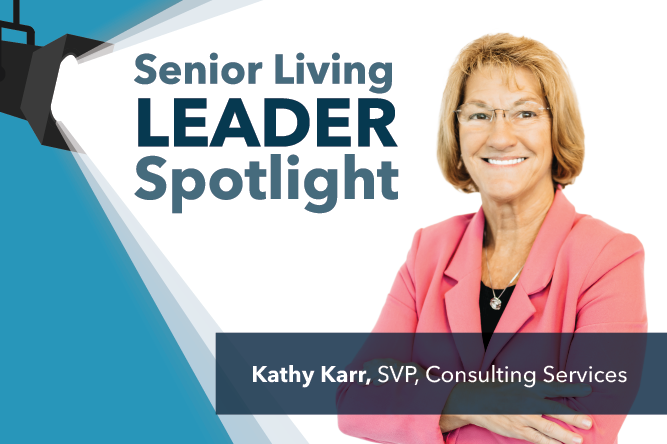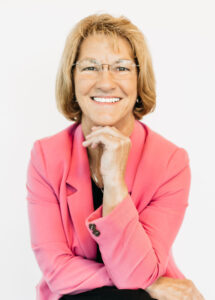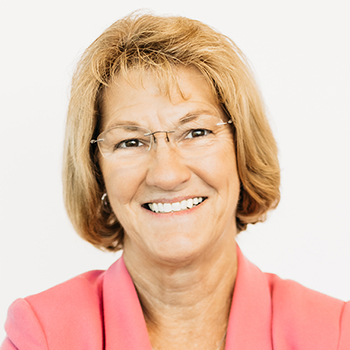
With over four decades of healthcare experience in positions ranging from nursing assistant to director of nursing, nursing home administrator, and director of operations, Kathy Karr has certainly “walked the walk” in nursing home and senior living operations. Now, as SVP, Consulting Services for Health Dimensions Group, Kathy applies her years of firsthand experience to optimize operational, clinical, and financial outcomes for HDG’s consulting clients.
Kathy earned her nursing degree from Carl Sandburg College and her Bachelor of Science in Healthcare Administration degree from St. Joseph College.
Kathy can assist your organization with:
In this senior living leader spotlight interview, Kathy gives insight into solutions for meeting regulatory guidelines, turning around a struggling community, and how she found her passion working in senior care.
Q: What do you see as the biggest challenge that senior care and living leaders will face in the next year?
A: The biggest challenge that senior care and living leaders will face in the next year is license and direct care staffing requirements. With the changes required in staffing, RN coverage will become a major challenge, and PRN coverage for RN coverage will be difficult to achieve, especially in rural facilities. The new facility assessment requirements specify that the facility resident population should drive the staffing decisions and determine the skills and competencies that staff must possess to deliver care. Even though the facility assessment is intended to help facilities identify the appropriate amount of staff and resources required, surveyors will continue to survey facilities for sufficient nursing staff that meet the needs of the residents.
Q: What advice would you give to providers struggling with regulatory compliance?
A: Go back to basics: pull out the Quality Assurance and Performance Improvement (QAPI) and perform a root cause analysis on areas that are below standard of care. Facility managers should be aware of the requirements for their areas of responsibility, whether it be in the kitchen, personal resident care, business office, or clinical needs. Leaders need to hold the managers accountable for their part in QAPI and lead the process in each area requiring improvement. Ultimately, the culture within the facility will dictate if you are successful.
Q: Where can you be found on your days off?
A: Generally, I can be found walking. I enjoy walking on the beaches of Mexico with my family, in the state parks of Arkansas, on paths around my neighborhood, or on my treadmill while reading a good mystery. If I am not walking, I can be found in my jacuzzi just relaxing. I have ten highly active grandchildren who are all involved in some type of sports, and I love going to watch their practices and games as much as I can.
Q: If you could change one thing about the senior living and care industry, what would it be and why?
A: I would change the image of the senior living and care industry. I have seen so much love and care provided to seniors across the country from staff who work endlessly to provide the best care possible, which is often unrecognized. I do not believe the public understands the care and compassion that the staff provides for the seniors they care for.
Q: Dogs or cats?
A: I don’t have any pets right now, but I have had several dogs over the years. I do occasionally dog-sit for my son’s dog, Sansa. Sansa frequently goes along for the ride to the airport to pick me up; she greets me with all the dog kisses a person needs. I have found that if given proper care and attention, a dog’s love for you is unconditional.
Q: With many senior care and living communities struggling to stay open, what actions should leaders of challenged communities take to turnaround their communities and avoid closure?
A: Leadership should embrace the QAPI process in communities to drive continuous regulatory compliance. Stay abreast of national and state changes in rules and regulations and pivot to make changes quickly. Invest in a regulatory mock/PREP survey at least six to eight months prior to the opening of the annual window. Make sure the National Safety Network is reported as required; the national average of providers being cited for noncompliance is 23.69 percent.
Q: When did you know you wanted to work with seniors?
A: I started working with seniors as a teenager. After obtaining a degree as a registered nurse, I joined a hospital system in pediatric care. After one year, I quickly knew my heart was in senior living. After 45 years of providing care and service to senior living, I still love it. I have never once woken up and thought, “I do not want to go to work today.” I have embraced learning something new every day from seniors who worked so hard to develop this world so I would be able to enjoy what I do every day.
Q: What is a common deficiency you often find during mock/PREP surveys, and how can it be avoided?
A: Infection control is a common deficiency often found during mock surveys. Infection control incorporates all areas of a senior living facility, including personnel (direct and indirect care functions), culinary, environmental services, contracted staff, volunteers, student nurses, and even vendors. To avoid deficiencies a facility should have an established prevention and control program (IPCP 2), have a certified infection preventionist, have current policies and procedures, and have monthly reports with an annual review of the program.
Q: What has been your greatest accomplishment in your career?
Raising my three children has been a successful journey: one is a machinist for a space technologies company, one is a family nursing practitioner, and the youngest is an EMT and firefighter. I am very proud of them. I am also blessed with ten grandchildren and five great-grandchildren who have contributed to my life. All the while, spending forty-five years caring for seniors and doing something I love to do gives me a great feeling of giving to others as well.
Q: What is your favorite of HDG’s values and why?
A: “Integrity” is my favorite value because it aligns with my own ethics that guide me in my personal life. Integrity is doing what you said you would do in areas such as decision-making, interacting with colleagues, and servicing customers or clients. Managers can trust that employees with integrity are working diligently. Integrity builds trust, and trust builds respect, which is another one of our company’s values.
How Kathy and HDG Can Help You
 Kathy and the rest of the Health Dimensions Group team can support you through a variety of consulting services, including operational assessments, clinical consulting, mock surveys, and turnaround support. With decades of experience as senior living and care community operators and consultants, our team is uniquely positioned to help your community. Contact us at info@hdgi1.com or 763.537.5700 to learn how our team can help your organization achieve success.
Kathy and the rest of the Health Dimensions Group team can support you through a variety of consulting services, including operational assessments, clinical consulting, mock surveys, and turnaround support. With decades of experience as senior living and care community operators and consultants, our team is uniquely positioned to help your community. Contact us at info@hdgi1.com or 763.537.5700 to learn how our team can help your organization achieve success.






